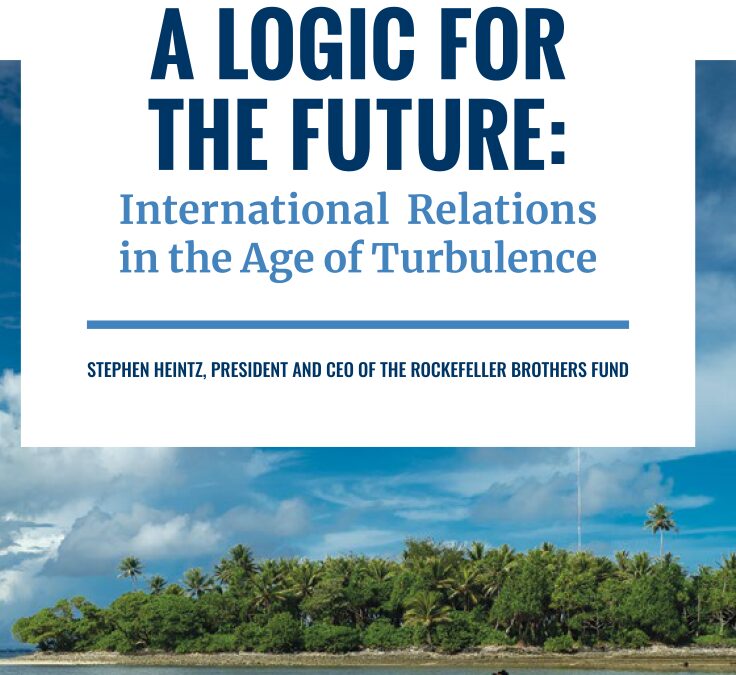by Sam Wolfson in The Guardian…‘This is the idea of catabolic collapse: that what we’re living through is a series of crises … It’s not going to be a sudden event.’ A subreddit tracking apocalyptic news in a calm, logical way comforts users who believe the end times are now
Critical responses to global systemic risk in an era of polycrisis
by Ruth Richardson in the International Journal of Disaster Risk Science…As grand challenges intensify and intersect across the globe, policymakers and decision makers at all levels continue to face mounting pressures. Increasing fiscal and financial constraints, cognitive overload, and a persistent lock-in to crisis response modes prevent—or, indeed, derail—the development of long-term policies and actions needed to move toward a safer, more just, and sustainable future.
From polycrisis to metacrisis: a short introduction
by Rufus Pollock and Rosie Bell in Life Itself.org…Our new white paper on the polycrisis and metacrisis: what they are, how they are distinct, how they are related and why it matters.
Systemic risk and the polycrisis
by Florian U. Jehn in Existential Crunch…We now know that global systemic risk is the potential for disruption on a global scale, which is then realized because a single element in the system fails. The polycrisis is essentially the perfect storm we are experiencing right now of multiple global systemic risks being triggered at the same time, making each other worse and leading to a much more difficult response, as you have to put out so many fires at once.
A Logic For The Future
from the Long Now Foundation…Stephen Heintz and Kim Stanley Robinson will discuss our polycrisis, and the swift and holistic reform of global governance institutions that is needed to respond to these urgent transnational and planetary challenges we are facing.
What is this era of calamity we’re in? Some say ‘polycrisis’ captures it
by Matthew Cantor in The Guardian…The term ‘polycrisis’ has gained traction as we face one disaster after another. It’s overwhelming – but diagnosing the catastrophe is the first step to addressing it.
More in this category

Yuen Yuen Ang argues that we need a fundamentally different way of thinking about our biggest global problems
by Yuen Yuen Ang in Interest.co.nz…The polycrisis is paralyzing only for those who are attached to the old order. For those who are not, it offers what I would call a “polytunity” to usher in new paradigms that invert the way we think about the development process, the sources of solutions, and the role of the state.

Leadership in the polycrisis: How UK defense training can help us navigate a future of unprecedented environmental disruption
by Laurie Laybourn and Matt Ince in the Center for Climate and Security…Explicit investments in the development of emerging as well as current leaders must be considered a core element of building resilience within the context of the deepening climate and ecological crisis. Better leadership—at all levels—will support decision advantage under more challenging conditions. A failure to make these investments in leaders is likely to significantly undermine the effectiveness of societies to handle growing systemic risks and, in turn, to ensure that collective sustainability efforts meet the critical threshold needed to avoid catastrophic runaway environmental change.
Creative but disorganised: why philanthropy won’t solve the polycrisis
by Barry Knight in Alliance Magazine…‘There are massive problems; climate, conflict, the economy are chief among them. Our international system for dealing collaboratively with any problem that crosses a border is out of date and needs to be rethought.’

The incredible, world-altering ‘Black Swan’ events that could upend life in 2025
From Politico Magazine…15 futurists, foreign policy analysts and other prognosticators provide some explosive potential scenarios for the new year.
Hope in the Face of the Polycrisis
by Jacob Bornstein & Mesa Sebree in Mediators Foundation…Historically, the leading causes of mass disruption across the world can be boiled down to the following threats: disease, economic mismanagement, environmental changes (natural and human-made), and violence (typically in relation to authoritarianism or fascism).
Implications of the polycrisis for resilience in humanitarian action
Cascade Institute presents Thomas Homer-Dixon…Implications of the polycrisis for resilience in humanitarian action. A Forum for European and Central Asia National Society Leaders.

A logic for the future: International relations in the age of turbulence
by Stephen Heintz in the Rockefellerl Brothers Fund…Many of the causes and consequences of present-day turmoil are transnational or even global in nature. These conflicts have no regard for borders and are not responsive to solutions devised and implemented by individual nation-states or the existing ecosystem of multilateral institutions.
A philanthropic theory of systems transformation for advancing equity in the polycrisis
by Michael Quinn Patton & Ruth Richardson in The Foundation Review…Intervening to mitigate and reverse the effects of the polycrisis challenges change agents, program designers, foundations, and evaluators to move beyond traditional
project-level thinking and autonomous foundation grantmaking to engage in
collaborative, principles-driven systems transformation.
Chartbook 330: Africa & absolute poverty in an era of polycrisis.
by Adam Tooze in Chartbook….Since 2015, the push to raise the world’s population out of the direst deprivation, has stagnated. As the World Bank authors acknowledge, we are “facing a lost decade in the fight against global poverty”.
Our polycrisis demands a radically new approach to risk management
By Ruth Richardson in Open Access Government…A fundamental part of the problem is that our current tools and strategies aren’t designed to assess the types of systemic risks that we face: risks that manifest as extreme global shocks, interconnect with one another, and turn into long-term crises. More often than not, risk assessment is siloed or focused only narrowly on certain issues or “known” problems.
New paper: Polycrisis Research & Action Roadmap
by the Cascade Institute, et al….The authors define the core characteristics of polycrisis
(emergent harms, multiple causes, deep uncertainty, systemic context, and new knowledge and action) and
identify gaps, opportunities, and priorities across four dimensions (theoretical foundations, empirical
research, practical applications, community building).
‘Polycrisis’ threatens planetary health; UN calls for innovative solutions
by Sean Mowbray in Mongabay…Environmental, technological and social challenges are colliding to create a global polycrisis. This confluence of issues is in turn placing increased pressure on the already existing environmental challenges of rapid climate change, rampant pollution and biodiversity loss — ultimately threatening planetary health and human well-being.
Are journalists reporting the global polycrisis?
by Gabi Mocatta in Earth Journalism …This study clearly
establishes that
the term ‘global polycrisis’
is not widely recognized,
or used by journalists.
Second Renaissance: A time of civilizational crisis and awakening
by Sylvie Barbier, et al. in the whitepaper, The Second Renaissance is both a period and a movement: a “time between worlds”, and a growing movement of people working to build shared understanding towards a radically wiser
future.
The new hot wars
by Jeremy Brecher in Znetwork…The most blatant marker of the polycrisis is the burgeoning of war and preparation for war.

